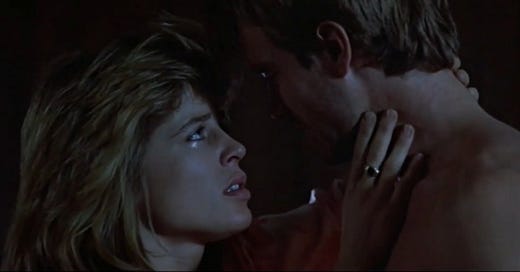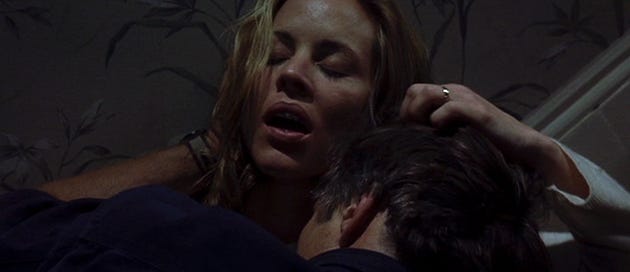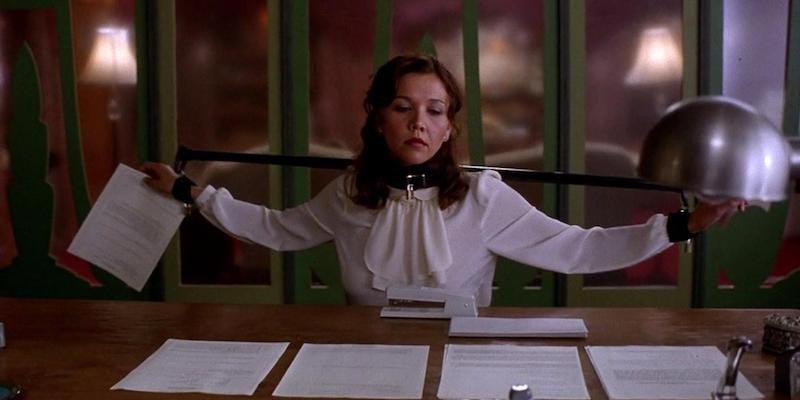Every three months, some Twitter account goes viral complaining that movies have too much sex, and we enter a predictable cycle. People quote retweet with accusations of prudishness, there is public fretting about “the new Puritanism,” and it all gets linked back to reports that Gen-Z has less sex than previous generations. Why do we keep having this pointless conversation? What is it that makes it so pervasive? I want to seriously address the insidious argument against sex scenes and explain why this narrative just won’t die.
The anti-sex scene argument is made up of three major points, all lies. First, sex scenes are offensive to viewers and that matters. Second, there are too many sex scenes in modern film. And third, sex scenes are pointless. To keep the mood light, I’ll be sharing a random smattering of stills from some of my favorite onscreen sex scenes. Content warning for some very mild, mostly tasteful nudity.
First Lie: Sex scenes are offensive to viewers and this is important
I first saw the anti-sex scene argument on Reddit when Game of Thrones was on TV. There were constant threads about women feeling hurt by their male partner’s interest in the show. While it is ridiculous to compare watching a subpar HBO drama to adultery, it’s also disingenuous to say “it’s just a show, get over it.” Television and film are meant to provoke emotional responses. What’s absurd is to stop a critical assessment of a piece of media at one’s initial emotional response, and to attempt to ban anything that you don’t like.
Blame the internet for our collective misinterpretation of “the personal is political.” It does not mean that every individual action or emotion has political importance. Frankly, most of what people feel is not that interesting. The avoidance of any possible discomfort—and the need to immediately blame your discomfort on someone or something else—is not a realistic impulse, nor is it a valid form of criticism. You are not being attacked when a movie scares you, as the people who read the Wikipedia pages of horror movies know. A sex scene, and the viewer’s response, is no different.
Second Lie: There are too many sex scenes in modern movies
But exactly how explicit are movies today? This is actually pretty easy to quantify, and so as to not be accused of bias, I’m going to use PluggedIn.com as the arbiter of what constitutes a sex scene. PluggedIn was founded by evangelical Christian organization Focus on the Family and reviews contemporary media based on how explicit the content is. If you are doubting their conservative bona fides, they condemned Brokeback Mountain because it didn’t adequately depict the “destructiveness of acting on homosexual temptations” and claimed Avatar: The Way of Water promoted idolatry. I will not be linking to them for those reasons.
Of the 25 highest grossing domestic films in 2022, only one featured a “brief” sex scene by PluggedIn’s standards—Bullet Train. Unless you consider the “passionate make-out sessions” of Where the Crawdad Sings and Scream, or the “dash of lightly sensual romance” of Top Gun to be sex, the idea that every mainstream movie has even a little bit of eroticism is, on its face, false. I highly doubt the anti sex-scene folks are packing into their local arthouse to see Titane, or Benedetta, or even Babylon—movies that did have explicit sex scenes and relatively minor impact at the box office.
Third Lie: Sex scenes are pointless
As you can see in my choice of stills, there are plenty of reasons to show sex on screen. Not just to explain the conception of a foretold hero (Terminator) or to demonstrate a woman’s loss of control (Jeanne Dielman, 23, quai du Commerce, 1080 Bruxelles, Chantal Akerman, 1975), but also to show how characters interact with each other. In Shame’s (Steve McQueen, 2011) many sex scenes, we see the depth of Brandon’s dysfunction and despair through his mechanical, compulsive sexual behavior. In Portrait of a Lady on Fire (Céline Sciamma, 2019), we see our lovers dispose of formality and find easy comfort in each other after they consummate their romance.
And even if a sex scene’s purpose is exclusively to titillate—so what? The thrilling, the daring, the visceral is what filmmaking has been about since its inception. Because it’s not pure excitement that the anti-sex scene crowd hates. Basically nobody cares that Marvel or Disney have built an empire selling non-stop fighting to children. Their only problem is depicting sex, and it’s part of the ongoing war against freedom of sexual expression waged by conservatives and the religious right.
First Truth: The argument that there are too many sex scenes in movies is a conservative talking point that has historically been used to stigmatize and marginalize identities that resist white supremacy
The ability to show sex on screen is an important and essential fight in the history of filmmaking and artistic expression. The Production Code (also known as the Hays code) that kept sex off-screen also banned any expressions of non-white, non-hetero, non-Christian identity. This was not a side effect; this was the intent. The Production Code was a tool of explicit white supremacy and capitalism that was upheld by Hollywood so they could sell their movies without fear of backlash. Joseph Breen, who oversaw the enforcement of the Production Code and was given an honorary Oscar for his contributions, was not just a Nazi sympathizer but a Nazi collaborator.
I have tried to write about this insidious, malformed debate so many times, and each time I get stuck on how painful and obvious the dog whistle is. All it takes is a few people to claim they’re “just asking questions” to get the entire, ridiculous discourse validated. The anti-sex scene folks are absolutely unconcerned with ending exploitation, or preventing sexual violence, or educating young viewers on issues of consent and safety. They are not engaging with even the most basic ideas about the gaze or objectification.
They just don’t want sexual expression outside of white, hetero sex. They claim any sex scene, in any movie, is shoved down their throat, as if the guards are at the gate demanding they watch Y Tu Mamá También at family movie night. It is identical to the tactics used by anti-trans crusaders, who stuck their foot in the door with innocent “questions” before attempting to ban access to healthcare and regulate children’s bodies.
The perpetuation of this discourse can partly be explained away as generated by teenagers and Twitter content trolls. But if you dig a little deeper, it becomes radiantly obvious that a lot of these people are grifters, bigots, and general purveyors of bad taste. This is a Twitter phenomenon unspecific to movies. It is the oldest, blandest conservative recruiting tactic: sidle up to someone, point out how much better it all used to be, and blame Black, queer, and Jewish people for what’s gone wrong.
I want us all to stop falling for it. I want us to celebrate decades of onscreen depictions of sex, whether they’ve been groundbreaking or mundane, and to push for more compelling portrayals of more types of sex. We fought for this right. Don’t give it up.










the ocean scene in sex & lucia has stayed with me a long time, it's so overwhelmingly JOYOUS, and beautifully-filmed!
I love this topic so much! I’ve been thinking of all these things since seeing Top Gun Maverick and wondering if there might be a new kind of Hays Code that has sprung up for the sake of the international market. There was a certain beauty in the clever innuendo used in the Hays Code days. It is entertaining to spot once you are aware of it. I would love to see modern films that tame thing down for international sales explore more of those kinds of things again.
There are certainly issues that come up for me with horrific stories like Last Tango in Paris where that certain director predilection to surprise actors while in production to capture the most real emotions possible collided with a non consensual sex scene. And pick any story revolving around Miramax that is full of horrible misogyny. This is where I am glad there are now more and more intimacy directors (albeit 40 years too late) on sets.
As long as these scenes are treated with respect and recognize everyone on set is working and not merely a puppet of the auteur, sex scenes can bring us in to the emotional depths (or even lack thereof) of a story.
I’m gonna get pretentious with my favorite sex scene as a short film fully dedicated to one. It is funny, clumsy, honest. It still exists as ultimately a male fantasy but I think it also gives agency to both parties in a fun way. It always charms me when I revisit it.
https://vimeo.com/15704652